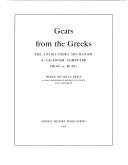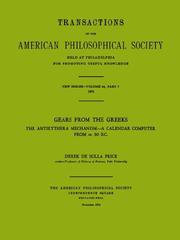| Listing 1 - 6 of 6 |
Sort by
|
Book
ISBN: 9781627343589 162734358X Year: 2021 Publisher: Irvine : Universal Publishers,
Abstract | Keywords | Export | Availability | Bookmark
 Loading...
Loading...Choose an application
- Reference Manager
- EndNote
- RefWorks (Direct export to RefWorks)
"This book tells the story behind the genius of the Antikythera Mechanism, including the decoding of its secrets in the last 120 years. It gives the ancient Greek historical context that makes sense of the computer: explaining its matchless genius. Vallianatos explains how and why Greek scientists employed advanced engineering in translating the beautiful conception of the Antikythera Mechanism into an astronomical computer of genius: a bronze-geared device of mathematical astronomy predicting the eclipses of the Sun and the Moon; calculating the risings and settings of important stars and constellations; the movements of the planets around the Sun, while mechanizing the predictions of scientific theories. The computer's accurate calendar connected these cosmic phenomena to the Olympics and other major Panhellenic religious and athletic celebrations, bringing the Greeks closer to their gods, traditions, and the Cosmo. This book should be of special interest to those interested in Greek civilization and the history of science"--
Antikythera mechanism (Ancient calculator) --- Astronomical clocks --- Machine d'Anticythère. --- Horloges astronomiques --- History. --- Histoire.

ISBN: 0882020196 Year: 1975 Publisher: New York Science history publications
Abstract | Keywords | Export | Availability | Bookmark
 Loading...
Loading...Choose an application
- Reference Manager
- EndNote
- RefWorks (Direct export to RefWorks)
Book
ISBN: 0190618590 0190618582 9780190618582 9780190618599 9780199739349 019973934X Year: 2017 Publisher: New York, New York : Oxford University Press,
Abstract | Keywords | Export | Availability | Bookmark
 Loading...
Loading...Choose an application
- Reference Manager
- EndNote
- RefWorks (Direct export to RefWorks)
"The Antikythera Mechanism, now 82 small fragments of corroded bronze, was an ancient Greek machine simulating the cosmos as the Greeks understood it. Reflecting the most recent researches, A Portable Cosmos presents it as a gateway to Greek astronomy and technology and their place in Greco-Roman society and thought"-- "From the Dead Sea Scrolls to the Terracotta Army, ancient artifacts have long fascinated the modern world. However, the importance of some discoveries is not always immediately understood. This was the case in 1901 when sponge divers retrieved a lump of corroded bronze from a shipwreck at the bottom of the Mediterranean Sea near the Greek island of Antikythera. Little did the divers know they had found the oldest known analog computer in the world, an astonishing device that once simulated the motions of the stars and planets as they were understood by ancient Greek astronomers. Its remains now consist of 82 fragments, many of them containing gears and plates engraved with Greek words, that scientists and scholars have pieced back together through painstaking inspection and deduction, aided by radiographic tools and surface imaging. More than a century after its discovery, many of the secrets locked in this mysterious device can now be revealed. In addition to chronicling the unlikely discovery of the Antikythera Mechanism, author Alexander Jones takes readers through a discussion of how the device worked, how and for what purpose it was created, and why it was on a ship that wrecked off the Greek coast around 60 BC. What the Mechanism has uncovered about Greco-Roman astronomy and scientific technology, and their place in Greek society, is truly amazing. The mechanical know-how that it embodied was more advanced than anything the Greeks were previously thought capable of, but the most recent research has revealed that its displays were designed so that an educated layman could understand the behavior of astronomical phenomena, and how intertwined they were with one's natural and social environment. It was at once a masterpiece of machinery as well as one of the first portable teaching devices. Written by a world-renowned expert on the Mechanism, A Portable Cosmos will fascinate all readers interested in ancient history, archaeology, and the history of science"--
Antikythera mechanism (Ancient calculator) --- Astronomy, Ancient --- Calendar, Greek. --- Technology --- Science --- History --- Greece --- Antikythēra Island (Greece) --- Intellectual life --- Antiquities.
Book
ISBN: 9780199739349 019973934X Year: 2017 Publisher: New York, NY, United States of America : Oxford University Press,
Abstract | Keywords | Export | Availability | Bookmark
 Loading...
Loading...Choose an application
- Reference Manager
- EndNote
- RefWorks (Direct export to RefWorks)
"The Antikythera Mechanism, now 82 small fragments of corroded bronze, was an ancient Greek machine simulating the cosmos as the Greeks understood it. Reflecting the most recent researches, A Portable Cosmos presents it as a gateway to Greek astronomy and technology and their place in Greco-Roman society and thought" "From the Dead Sea Scrolls to the Terracotta Army, ancient artifacts have long fascinated the modern world. However, the importance of some discoveries is not always immediately understood. This was the case in 1901 when sponge divers retrieved a lump of corroded bronze from a shipwreck at the bottom of the Mediterranean Sea near the Greek island of Antikythera. Little did the divers know they had found the oldest known analog computer in the world, an astonishing device that once simulated the motions of the stars and planets as they were understood by ancient Greek astronomers. Its remains now consist of 82 fragments, many of them containing gears and plates engraved with Greek words, that scientists and scholars have pieced back together through painstaking inspection and deduction, aided by radiographic tools and surface imaging. More than a century after its discovery, many of the secrets locked in this mysterious device can now be revealed. In addition to chronicling the unlik ely discovery of the Antikythera Mechanism, author Alexander Jones takes readers through a discussion of how the device worked, how and for what purpose it was created, and why it was on a ship that wrecked off the Greek coast around 60 BC. What the Mechanism has uncovered about Greco-Roman astronomy and scientific technology, and their place in Greek society, is truly amazing. The mechanical know-how that it embodied was more advanced than anything the Greeks were previously thought capable of, but the most recent research has revealed that its displays were designed so that an educated layman could understand the behavior of astronomical phenomena, and how intertwined they were with one's natural and social environment. It was at once a masterpiece of machinery as well as one of the first portable teaching devices. Written by a world-renowned expert on the Mechanism, A Portable Cosmos will fascinate all readers interested in ancient history, archaeology, and the history of science^^^
HISTORY / Ancient / Greece. --- Antikythera mechanism (Ancient calculator) --- Astronomy, Ancient --- Calendar, Greek. --- Science --- Technology --- Calendrier grec --- Sciences --- Technologie --- History --- Histoire --- Jusqu'à 1500 --- Greece --- Antikythera Island (Greece) --- Grèce --- Anticythère (Grèce) --- Intellectual life --- Antiquities. --- Vie intellectuelle --- Antiquités --- Astronomy, Greek --- Science, Ancient --- Astronomie grecque --- Sciences anciennes --- Antikythēra Island (Greece) --- Jusqu'à 1500 --- Grèce --- Anticythère (Grèce) --- Antiquités

ISBN: 0871696479 9780871696472 Year: 1974 Volume: 64,7 Publisher: Philadelphia (Pa.): American philosophical society,
Abstract | Keywords | Export | Availability | Bookmark
 Loading...
Loading...Choose an application
- Reference Manager
- EndNote
- RefWorks (Direct export to RefWorks)
Antikythera mechanism (Ancient calculator) --- Calendar, Greek --- Antikythēra Island (Greece) --- Antiquities --- Astronomical clocks --- -Astronomy, Greek --- Greek calendar --- Greek astronomy --- Clocks, Astronomical --- Astronomical instruments --- Clocks and watches --- History --- Cerigotto --- -Antiquities --- Astronomy, Greek --- Mathematical instruments --- Aegilia Island (Greece) --- Andikithira Island (Greece) --- Anticythera Island (Greece) --- Antikithera Island (Greece) --- Antikythira Island (Greece) --- Cerigotto Island (Greece) --- Nēsos Antikythēra (Greece) --- Nisos Andikithira (Greece) --- Nisos Antikythira (Greece) --- Antiquities. --- Antikythēra Island (Greece) - Antiquities
Book
ISBN: 3662484455 3662484471 Year: 2016 Publisher: Berlin, Heidelberg : Springer Berlin Heidelberg : Imprint: Springer,
Abstract | Keywords | Export | Availability | Bookmark
 Loading...
Loading...Choose an application
- Reference Manager
- EndNote
- RefWorks (Direct export to RefWorks)
This book presents a systematic design methodology for decoding the interior structure of the Antikythera mechanism, an astronomical device from ancient Greece. The historical background, surviving evidence and reconstructions of the mechanism are introduced, and the historical development of astronomical achievements and various astronomical instruments are investigated. Pursuing an approach based on the conceptual design of modern mechanisms and bearing in mind the standards of science and technology at the time, all feasible designs of the six lost/incomplete/unclear subsystems are synthesized as illustrated examples, and 48 feasible designs of the complete interior structure are presented. This approach provides not only a logical tool for applying modern mechanical engineering knowledge to the reconstruction of the Antikythera mechanism, but also an innovative research direction for identifying the original structures of the mechanism in the future. In short, the book offers valuable new insights for all readers who are interested in the Antikythera mechanism.
Physics - General --- Physics --- Physical Sciences & Mathematics --- Antikythera mechanism (Ancient calculator) --- Astronomical clocks --- Calendar, Greek. --- History. --- Greek calendar --- Clocks, Astronomical --- Astronomical instruments --- Clocks and watches --- Mathematical instruments --- Engineering. --- Science --- History and Philosophical Foundations of Physics. --- Machinery and Machine Elements. --- Science Education. --- History of Science. --- Study and teaching. --- Annals --- Auxiliary sciences of history --- Science education --- Scientific education --- Construction --- Industrial arts --- Technology --- Physics. --- Machinery. --- Science education. --- Machinery --- Machines --- Manufactures --- Power (Mechanics) --- Mechanical engineering --- Motors --- Power transmission --- Natural philosophy --- Philosophy, Natural --- Physical sciences --- Dynamics --- Curious devices
| Listing 1 - 6 of 6 |
Sort by
|

 Search
Search Feedback
Feedback About UniCat
About UniCat  Help
Help News
News